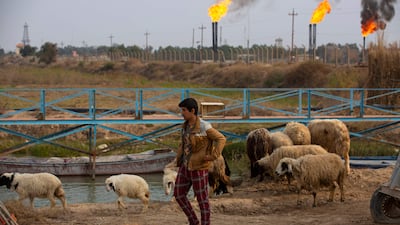Iraq’s government debt is set to fall "steeply" as a share of its economic output this year due to higher oil prices, restoring its gross domestic product to pre-Covid-19 pandemic levels, but the decline may not be sustainable, due to political tensions that have constrained public spending and reflect the country's high political risk, Fitch Ratings said.
The debt of Iraq's government as a percentage of GDP is forecast to fall to about 47 per cent this year from 66 per cent of output in 2021, the biggest fall of any government in the Middle East and North Africa, the rating agency said.
Iraq, Opec’s second-largest producer, depends on oil revenue to meet 90 per cent of government expenditure and on Wednesday, the country announced the discovery of several new oil wells in the province of Anbar, in the west of the country. Oil export revenue is expected to rise by 75 per cent as prices and crude exports increase.
Iraq exports an average of 3.3 million barrels of oil per day, while production in the semi-autonomous Kurdish region amounts to just over 450,000 bpd.
Oil prices have hovered at or above $100 a barrel since Russia’s military offensive in Ukraine started in February. Brent, the key benchmark for two thirds of the world's oil, surged to near $140 in March and is up about 36 per cent since the start of the year.
Fitch forecasts that oil prices will average $105 a barrel this year and $85 in 2023, boosting revenue for the government and economic growth.
Iraq is rated ‘B-’ by Fitch, six notches below investment grade, indicating that material default risk is present, but a limited margin of safety remains and financial commitments are currently being met. The rating also indicates that that the capacity for continued payment is vulnerable to deterioration in the business and economic environment.
Despite the higher oil prices, rise in crude production and exports, that have reduced the government debt to GDP ratio and boosted foreign currency reserves, there is still "significant uncertainty about public finance trends and the oil price outlook", Fitch said.
Iraq’s falling debt ratio also reflects the country's failure to form a government and pass a budget since its October 2021 elections, Fitch said. This constrained spending to 2021 levels until parliament passed an emergency funding bill on June 6 to allocate $17 billion, or 7 per cent of GDP, for food and energy subsidies and salaries.
The rating agency said Iraq's subsidy programmes remain unreformed and were in danger of running out of money due to the rise in global commodity prices.
Fitch forecasts Iraq will record a 17 per cent of GDP fiscal surplus in 2022, based on a 6 per cent of GDP boost in spending.
However, it warned "risks to our spending forecasts are on the upside, as any new budget is likely to entail higher spending in light of Iraq’s pressing social and economic development needs".
"We still forecast some nominal reduction of debt in 2022 if a new budget passes, in particular of accumulated central bank claims on the government, which had risen to about 13 per cent of GDP in 2021."
The rating agency also said that if spending picks that could impair the reduction of public debt.
"It remains unclear whether an incoming government will execute reforms put forward in a whitepaper under the previous administration in October 2020, even if Prime Minister Mustafa Al Kadhimi is reappointed," Fitch said.
Fitch cited the removal of proposals for income tax reform from the 2021 budget by parliament, while other reforms, such as the removal of fuel subsidies for electricity generation, were approved, but not implemented.
Iraq's political outlook remains volatile in the wake of the resignation of the largest parliamentary faction led by Shiite cleric Moqtada Al Sadr. Although Mr Al Sadr’s political group emerged in the strongest position after October's elections, gaining 73 seats out of 328 in the country's national assembly, he failed to form a government with his allies, prompting him to order his MPs to resign on June 12.
"The reordering of forces in parliament may enable government formation. However, Mr Sadr retains considerable influence outside parliament and the underlying tensions that have hobbled Iraq’s politics will persist, including over Iranian influence and Kurdish oil autonomy," Fitch said.
"Public grievances could boil over into broader social instability, as they did in 2019-2020, with protests ultimately leading to early elections ... we expect persistently high levels of political risk and weak governance will continue to weigh on the sovereign rating."
Iraq's economy, according to International Monetary Fund forecasts before the latest political developments, was set to expand 9.5 per cent this year and 5.7 per cent in 2023. The World Bank forecasts growth of 8.8 per cent this year and 4.5 per cent in 2023.


